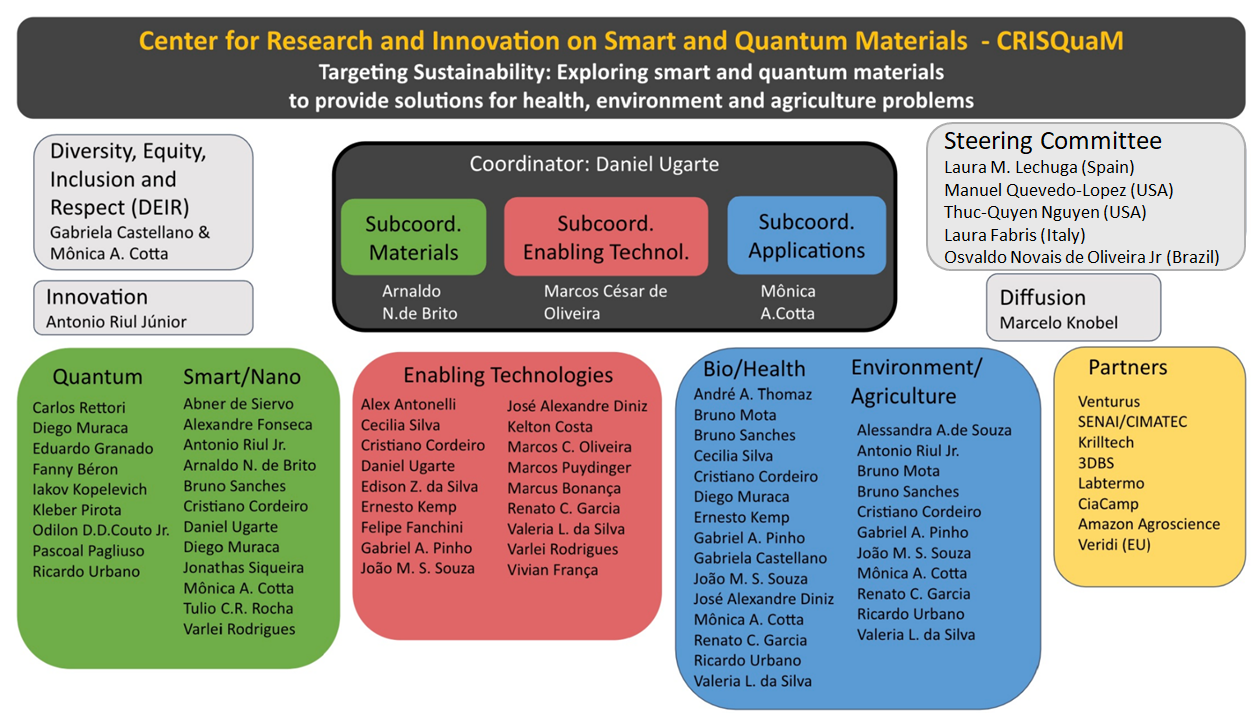BV-FAPESP: research projects supported in this Center
CRISQuaM in the Media: news about the center
CRISQuaM aims to explore the synergistic development of fundamental and applied science to create new materials with high potential for the construction of devices and sensors to address technological challenges related to sustainability, climate change, precision agriculture, ecology, and health. To achieve these goals, we have assembled an interdisciplinary and collaborative research team, integrating expertise across various scientific domains, researching novel materials with high innovation potential. By combining original synthesis methods, advanced characterization techniques, theoretical approaches, computational simulations, quantum technologies, and device construction designs, we aim to drive advances in smart and quantum materials, promoting scientific excellence and technological development. With this, we plan disruptive innovations in instrumentation—including hardware and AI-based tools—as well as in quantum technologies, biomedical devices, and signal processing, in addition to plant bionics, exploring plant-pathogen interactions. Besides research activities, we plan intensive actions in education, dissemination, and communication for the general public, as a modern society should be aware of the challenges humanity faces and how research and technology are essential for responsibly utilizing the planet's limited resources. CRISQuaM's Innovation activities are accelerated through partnerships with several companies in related technologies, many of them Brazilian. Finally, all activities of the Center are managed in accordance with diversity, equity, and inclusion goals and best practices.
The Center brings together scientists, engineers, and innovators in a collaborative effort to apply materials science and quantum technologies at the cutting edge, designing new materials and nano(bio)sensors for advanced diagnostics. The Center has a team capable of producing a wide range of (nano/micro) materials, along with precise chemical and physical characterizations using modern techniques (synchrotron, advanced microscopy, magnetotransport, magnetic resonance, optics, etc.). In addition, the team offers various options in enabling technologies, including miniaturization, processing, and additive manufacturing, as well as instrumentation, quantum sensing, and electronics development. Data analysis will employ updated approaches (numerical simulation, classical and quantum machine learning, and quantum optimization). Applications at the knowledge frontier will address urgent sustainability needs in environmental areas, precision agriculture, plant bionics, and biomedical interfaces, contributing to the development of local technologies in close partnership with the Brazilian industry.
The organization of the Center is based on three pillars — Materials, Enabling Technologies, and Applications — together with partner companies, as described in the figure below.

2023-09-18
Brazilian researchers and collaborators in Germany and the US compiled data from 195 clinical trials conducted in 30 countries between January 2020 and December 2021. The findings are promising, although the authors stress the need for enhanced controls in the making of the products used in cell therapy.
2023-09-13
A comprehensive review by researchers in Brazil and elsewhere provides a wealth of information about the effects on the organism of remaining seated for much of the day, and calls for more research to analyze the effectiveness of interventions to reduce or interrupt sedentary behavior.
2023-09-13
Acetone, a key input for the chemical industry, is usually produced by an elaborate and hazardous process. A more sustainable strategy has been developed by a scientific collaboration between researchers in Brazil and Germany.
2023-09-13
Researchers at the Federal University of São Paulo conducted experiments involving rats to analyze the effects of a high-fat high-sugar parental diet. The results suggested that ingestion of hypercaloric food by male progenitors favors weight gain and a build-up of body fat in their offspring.
2023-09-13
The researchers correlated data on the animal’s ecological niche and connectivity among populations with existing and planned hydropower development sites in Brazil’s South region. They estimated that 30% of its habitat could be lost, heightening the risk of extinction.
2023-09-13
Researchers at the University of São Paulo highlight the importance of monitoring these areas and advocate the use of technosols based on tailings and other waste to offset part of their emissions.
2023-09-06
The fourth-generation particle accelerator installed at the Brazilian Synchrotron Light Laboratory (LNLS) was the topic for the 4th FAPESP Lecture 2023. LNLS Director Harry Westfahl Junior described the facility and the research opportunities it offers. He also announced the third call for proposals.
2023-09-06
Technology developed with FAPESP’s support was the winner in the “Technological Innovation” category. Also, a University of São Paulo study that found a molecule capable of killing leukemic cells was awarded in “Oncology Research” category.